Our Members Asked:
Is it better to eat farmed salmon or wild salmon? Which one has more omega-3s and less contamination with PCBs, mercury, etc.?
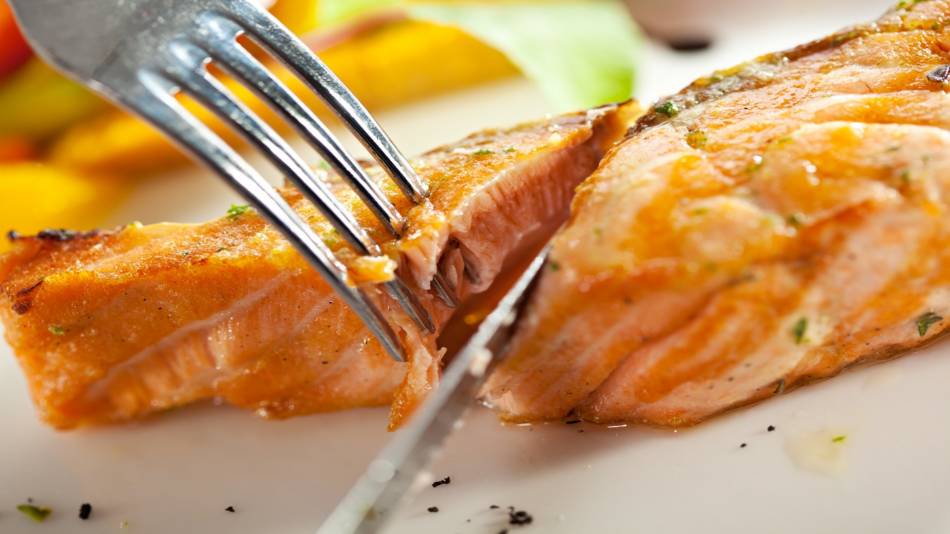
Answer:
Wild salmon is leaner than farmed salmon, which is fattier. Consequently, farmed salmon has tended to provide significantly higher amounts of the omega-3 fatty acids EPA and DHA per serving than wild salmon. However, farmed salmon must be fed fish oil in order for their meat to provide high levels of omega-3s (wild salmon get omega-3s from algae). With the demand for fish oil now outstripping supply, there is increasing use of vegetable oil in fish feed and levels of EPA and DHA in farmed fish are falling.
Farmed salmon will have higher, but still healthful, amounts of omega-6 fatty acids (mainly from vegetable oil), but less vitamin D than wild salmon.
Both types of salmon are low in mercury and tend to be low in PCBs (toxins which may increase the risk of cancer), although wild salmon may have even lower amounts of PCBs than farmed salmon. Of course, amounts of omega-3s and contaminants can be affected by many variables in both wild and farmed salmon, particularly the food which is fed to farmed salmon.
A standard serving of salmon provides about 2 to 5 times as much omega-3 as a regular fish oil capsule. Although fish oil in supplements is normally less contaminated than fish meat, the contamination levels in salmon are fairly low to begin with and generally not of great concern.
For more information about farmed and wild salmon, a list of other fish rich in EPA and DHA, as well as our test results and comparisons of EPA and DHA in dozens of fish/marine oil supplements, see the Fish Oil and Omega-3 Supplements Review (including Krill, Algae, Calamari, and Green-lipped Mussel Oil) >>
Also see how levels of omega-3s and contaminants vary across canned fish products in our Canned Tuna and Canned Salmon Review.
Join today to unlock all member benefits including full access to all CL Answers and over 1,400 reviews.
Join NowAlready a member? Sign In Here.
Join now at www.consumerlab.com/join/



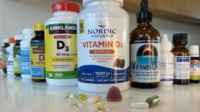

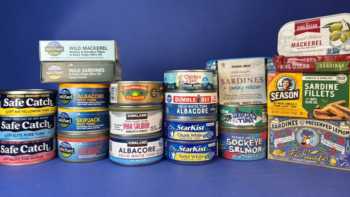
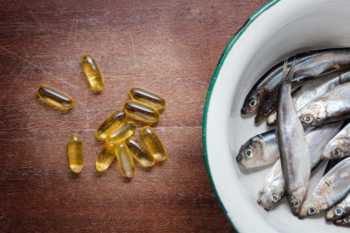






Adam3128
January 03, 2016As an FYI to everyone out there, unless stated otherwise, every sushi restaurant in the USA serves farm raised salmon. I stopped eating sushi salmon about a year ago.
Reply to this post…
Evalynne3124
February 10, 2015Thanks for further expanding your comments on Farmed vs. Wild Salmon. Could you address the extent of "inflammation" caused by eating Farmed Salmon. Many of the health gurus whom advocate eating Wild Salmon claim that Farmed Salmon INCREASES INFLAMMATION rather than reducing it. Is there any evidence for this?
I also don't understand, why then, Farmed TROUT would be acceptable. Could one assume that this would also apply to Steelhead, as they are a "trout"?
This issue is exceedingly confusing, with so much hype on both sides ---- it's really hard to know what one can safely eat!
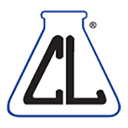 ConsumerLab.com
ConsumerLab.com
February 23, 2015Thank you Evalynne! Although farmed salmon tends to contain higher amounts of omega-6 fatty acids -- which some believe could promote inflammation -- the amounts do not exceed guidelines for intake. Please see the paragraph about omega-6 fatty acids in salmon for more information: https://www.consumerlab.com/reviews/fish-oil-supplements-review/omega3/#omega6
Reply to this post…
Denise3120
February 08, 2015Seriously, Just TASTE wild versus farmed salmon. After 2-3 years of getting wild overnighted alaskan salmon which is soooo pure you can eat it raw, in fact I do on the first night and going out to eat. The latter when often farmed salmon is used. its like eating to entirely different fishes! the taste of wild salmon leaves farmed salmon tasting no better than canned tuna! not to mention all the other environmentally excellent reasons for choosing wild.
Reply to this post…
Randy3118
February 03, 2015For those interested in sustainability, wild Alaskan salmon is rated "Green/Best Choice" by every credible environmental organization (msc.org, etc.), while nearly all farmed salmon is categorically rated "RED/AVOID"
Reply to this post…
David3114
February 03, 2015And that farmed salmon is dyed to give it color - I for one don't want artificial dye in my diet.
 ConsumerLab.com
ConsumerLab.com
February 08, 2015Hi David - Please see the added information about astaxanthin in the Fish Oil Review: https://www.consumerlab.com/reviews/%20/omega3/#food
Jimmy3115
May 07, 2020I'm actually allergic to farmed salmon and not wild caught. I think its the dyes they put in them.
Reply to this post…
Evan3110
February 02, 2015The Monterey Bay Aquarium Seafood Watch posts analyses of all types of seafood, taking into consideration environmental impact, whether the stock is sustainabley managed, how the fish is caught or farmed, etc.
They have three categories: Alaskan wild caught salmon is in the "Best Choice" category.
In the "Good Alternative" category is wild caught salmon from CA, OR, WA.
In the "Avoid" category is farmed salmon, largely because of the environmental impact.
For more details, visit http://www.seafoodwatch.org/
Some producers are asking permission from the federal government to begin farming genetically modified salmon. That decision has been pending for a while, so I'm not sure of the current status. -- Evan
Reply to this post…
mark3106
February 02, 2015Just a question...was that a typo? Farmed salmon have more Omega three's than wild? I've always, always read just the opposite. What testing data can be shown that backs up this reversal currently published conclusions on Omega 3's? If it's true, much money will be saved by all dedicated salmon lovers!
 ConsumerLab.com
ConsumerLab.com
February 08, 2015Hi Mark - Wild salmon has a higher percent of omega-3s as a percentage of total fat, but farmed salmon tend are usually fattier, and therefore tend to have more omega-3s per serving (also note that amounts can vary depending on the region, and the diet fed to farmed fish). Please see our expanded information about this in the Fish Oil Review: https://www.consumerlab.com/reviews/%20/omega3/#food
Rich3108
February 09, 2015I HAVE ALWAS WONDERED WHAT PART OF THE SALMON IS TESTED FOR FAT. THE BOTTOM (NEXT TO THE PLATE) TASTES VERY STRONG AND NOT REAL APPEALING. IS THAT THE LOCATION?
 ConsumerLab.com
ConsumerLab.com
February 26, 2015Hi Rich - That's a good question, thank you!
We've added some information about this to the Fish Oil Review, which you can find here: https://www.consumerlab.com/reviews/%20/omega3/#aursand
Reply to this post…
Nonna3099
February 02, 2015I've recently purchased "farmed Salmon", farms in the ocean, not restricted inland in unnatural environment and I'm able to get it every week fresh.....
Any comments?
Reply to this post…
Ted3092
February 01, 2015Since n3 fatty acids are not endemic to salmon but come from the food source, what is the rationale that farmed salmon has more n3?
 ConsumerLab.com
ConsumerLab.com
February 08, 2015Hi Ted - Farmed salmon are typically fed omega-3s in their diet, and contain more fat per serving than wild. However, substituting vegetable oil for fish oil in farmed fish feed may reduce levels of omega-3s. See the information added to the Fish Oil Review about this: https://www.consumerlab.com/reviews/%20/omega3/#food.
Ted3094
February 08, 2015Well if that's the case, it is better just to take fish oil supplements and avoid farmed salmon all together.
 ConsumerLab.com
ConsumerLab.com
February 08, 2015Fish oil supplements have been found to be helpful for certain conditions, but for cardiovascular benefits, there is more clinical evidence for eating fish twice a week. You can read more about this in the Summary of the Fish Oil Review: https://www.consumerlab.com/reviews/%20/omega3/#summary
Reply to this post…
Michael3090
February 01, 2015Doesn't farmed salmon have an extraordinary unhealthy amount of arachidonic acid (omega 6)?
 ConsumerLab.com
ConsumerLab.com
February 08, 2015Hi Michael - Thank you for your question. We've now added information about this to the Fish Oil Review: https://www.consumerlab.com/reviews/fish-oil-supplements-review/omega3/#food
Reply to this post…
Jerry3088
February 01, 2015The notion that farmed salmon has more DHA and EPA than wild salmon seems to contradict everything I've read! Supposedly, farmed salmon are fed a very different diet, one which does not contain many omega-3 fats. In contrast, wild salmon feeds on fish (and I think algae) that are supposedly high in Omega 3 fatty acids.
Is Consumer Lab sure of the reported result? Is it possible that due to an entry error, the relationship was reported in reverse? I hope Consumer lab will either confirm what's already been said, or if it's an inadvertent error, correct the information presented. Every article or statement I've ever seen talks about the relatively poor quantity of omega 3 fatty acids in farmed salmon.
Reply to this post…
Evalynne3086
February 01, 2015Are there any hard figures on the amount/difference in the inflammation factors?
I have understood that although farmed salmon has more Omega 3 than wild salmon, the problem occurs because of the inflammation that eating farmed salmon causes. Because of their "farm raised" DIET, farmed fish act as a highly inflammatory factor in our bodies rather than a highly anti-inflammatory one. Farmed salmon = inflammatory. Wild salmon = anti-inflammatory.
I'm hoping you will be able to produce some "facts" in this argument. I am so glad that CL has begun to investigate/evaluate some "real food" subjects in addition to supplements. I was hoping for more like your Answers to the "chocolate" question, so I am so happy that you have taken on the "salmon issue"! Please investigate further!
 ConsumerLab.com
ConsumerLab.com
February 08, 2015Thank you Evalynne! Some suggest that the higher levels of omega-6s in farmed salmon could be inflammatory, but it seems that levels are well below guidelines for intake. We've now added information about this to the Fish Oil Review: https://www.consumerlab.com/reviews/%20/omega3/#food
Reply to this post…
JOANNA3080
February 01, 2015However, farmed salmon could be the genetically modified type, making them bigger and fatter. If they got loose in the environment by accident or even intention, they'd end up causing the end of regular wild salmon by eliminating the wild fish food supplies.
JK
Deborah3082
February 21, 2015There are currently NO genetically modified salmon available anywhere.
 ConsumerLab.com
ConsumerLab.com
February 23, 2015Genetically modified salmon have been developed, but not yet officially approved for sale: http://www.fda.gov/AnimalVeterinary/DevelopmentApprovalProcess/GeneticEngineering/GeneticallyEngineeredAnimals/ucm280853.htm
Reply to this post…
Natasha3077
February 01, 2015Why are wild sardines not listed and evaluated?
 ConsumerLab.com
ConsumerLab.com
February 08, 2015Hi Natasha and Noah - Thank you for your suggestion. Sardines are a good source of omega-3s, as noted elsewhere in the Fish Oil Review ( https://www.consumerlab.com/reviews/%20/omega3/#using, https://www.consumerlab.com/reviews/%20/omega3/#liveroils); however, we will also add them to the list here: https://www.consumerlab.com/reviews/%20/omega3/#food.
Reply to this post…
Henry3075
February 01, 2015However - farmed salmon has about 1/3 the amount of VITAMIN D of wild salmon.
 ConsumerLab.com
ConsumerLab.com
February 08, 2015Hi Henry - Thank you, there are differences in amounts of vitamin D. We have now added information about this to the Fish Oil Review: https://www.consumerlab.com/reviews/fish-oil-supplements-review/omega3/#food
Reply to this post…
Andrew3074
February 01, 2015In addition to the nutritional value of farmed versus wild-caught salmon, make no mistake that wild salmon, especially from the Northwest is far superior in flavor! I assume that individuals who eat salmon do so for more than fatty acid content.
Reply to this post…
Ann3070
February 01, 2015It would be helpful to add that farmed salmon has been fed antibiotics and coloring to make it look orange since the diet for farmed salmon is an unnatural one. So even if it may be higher in omega 3's it may not be as healthy all around as wild salmon.
Reply to this post…
Mark3068
February 01, 2015I think it is a mistake to imply that farmed raised animals/fish of any species are superior to their natural counterparts. While some optimally fed and farmed species of salmon may have slightly higher amounts of omega 3's, most do not and, even for those that do, this fact alone is misleading. Those slightly higher omega 3 levels are counteracted by disproportionately increased levels of the unhealthy omega 6 and other fats. Even more problematic is the issue of toxic contamination outlined in below link which are much higher in farm raised fish. We have seen the health detriments of eating meat from cows that are raised un-naturally. Do we really need to wait and see what happens when we do the same thing to fish?
...http://www.ewg.org/research/pcbs-farmed-salmon
Michael3069
April 27, 2015The fact that you categorically think it is a mistake to EVER suggest that ANY farm raised product is superior to its "natural"/wild counterparts demonstrates you are more interested in a political belief than scientific evidence. There are numerous examples of farmed products being superior to wild equivalents (in terms of nutritional value, likelihood of microbial or toxic contamination, etc.). There are examples where wild is better. While there have been specific examples where farmed fish have more of a particular toxin, wild salmon, on average, has three times the mercury levels of farmed, and thus is much more dangerous to pregnant women (yet neither need be avoided to the degree some women believe). Don't get me wrong, I definitely prefer the flavor of sockeye or chinook (or even wild stealhead trout) to Atlantic farmed, and will pay some price premium for that. But the nutritional/health benefits are not a universal basis for choosing wild over farmed, for salmon or most agricultural products.
Reply to this post…
Sherry3062
February 01, 2015Farmed salmon can have significantly higher mercury and PCB levels, depending on the feed and conditions in the farm ponds. Wild salmon, on the other hand, rarely have any toxins since they generally live in very clean rivers. Wild salmon typically also tastes better than farm raised salmon, since the muscle (AKA meat) is well developed in the wild.
 ConsumerLab.com
ConsumerLab.com
February 08, 2015Hi Sherry - Both farmed and wild salmon are low in mercury. Farmed salmon does tend to be higher in PCBs, although levels vary depending on where the salmon is from, and what it is fed (e.g. fish oil vs vegetable oil).
Reply to this post…